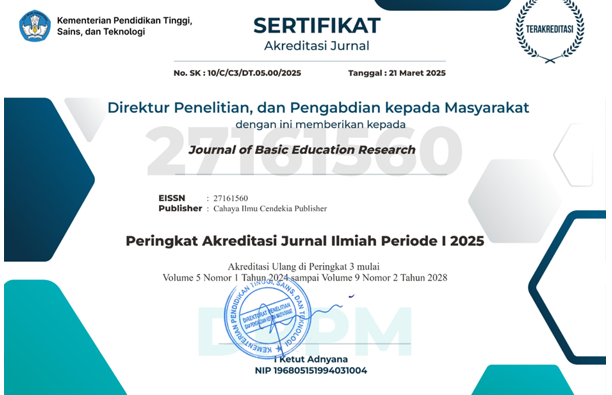Comparison of Love for the Motherland and Love for Peace in Social Studies Learning
Abstract
Purpose of this Research: The purpose of this study was to compare the character of love for the homeland and the character of peace in social studies learning
Research Methods: In this article, the author takes the title of the comparison between the character of love for the homeland and love of peace in social studies learning. That way, the hypothesis that the author compiles is 'The character of love for the homeland is higher than the character of peace-loving in learning social studies subjects. To test this, the authors conducted research with several social studies in schools. And also, to do the proof, the author conducted a statistical T-test.
Main Findings: The result is that each variable of the character of love for the homeland and the character of peace-loving has a significant comparison, with a value of sig < 0.05, and in each dominant variable in the good category.
Novelty of this Research: The novelty of the research compares the character of love for the homeland and the character of peace-loving. This study is to describe the comparison of religious and peace-loving characters.
References
Y. Siska, Y. Yufiarti, and M. Japar, “Nilai Pendidikan Karakter Dalam Pembelajaran Ips Di Sekolah Dasar,” J. Elem. Sch. Educ., vol. 1, no. 1, pp. 1–11, 2021, doi: 10.52657/jouese.v1i1.1324.
S. Suwartini, “Pendidikan Karakter dan Pembangunan Sumber Daya Manusia Berkelanjutan,” J. Pendidik. Ke-SD-an, vol. 4, no. 1, p. 222, 2017.
L. P. S. A. Luh De Liska, “Implementas Nilai-Nilai Pancasila Dalam Membangun Karakter Bangsa,” J. Widyadari, vol. 21, no. 2, pp. 676–687, 2020, doi: 10.5281/zenodo.4049444.
I. Ulumudin, “Penerapan Pendidikan Nasionalisme Terhadap Perilaku Siswa,” Bidayatuna J. Pendidik. Guru …, 2020.
R. Rahmad, “Nilai Karakter Cinta Tanah Air dan Gotong Royong Pada Kearifan Lokal Manugal Sebagai Sumber Belajar IPS Di Sekolah Dasar,” MENDIDIK J. Kaji. Pendidik. dan Pengajaran, vol. 7, no. 2, pp. 220–227, 2021, doi: 10.30653/003.202172.193.
K. N. S. Rahayu, “Pengaruh Model Pembelajaran Problem Based Learning Bermuatan Nilai Karakter Bangsa Terhadap SIkap Demokrasi Siswa di Sekolah Dasar,” Edukasi J. Pendidik. Dasar, vol. 3, no. 1, p. 71, 2022, doi: 10.55115/edukasi.v3i1.2310.
K. Hardiyanti, A. Astalini, and D. A. Kurniawan, “Sikap Siswa Terhadap Mata Pelajaran Fisika Di Sma Negeri 5 Muaro Jambi,” EduFisika, vol. 3, no. 02, pp. 1–12, 2018, doi: 10.22437/edufisika.v3i02.4522.
Indriyanti, E. Mulyasari, and Y. Sudarya, “Penerapan Pendekatan Saintifik Untuk Meningkatkan Keterampilan Bertanya Siswa Kelas V Sekolah Dasar,” J. Pendidik. Guru Sekol. Dasar, vol. II, no. II, pp. 13–25, 2017.
A. D.A., S. D.A., and M. S. Sumantri, “Pendidikan Karakter Cinta Tanah Air dan Kedisiplinan dalam Kegiatan Upacara Bendera di Sekolah Dasar DKI Jakarta,” EduStream J. Pendidik. Dasar, vol. 1, p. 5, 2021.
N. Solaikah, “Konstruksi Pendidikan Karakter Cinta Damai Dalam Film Di Timur Matahari,” Univ. Muhammadiah Surakarta, p. 24, 2014.
Y. D. Setyoningsih, “Konseling Kelompok dengan Teknik Psikodrama ‘Nilai Karakter Cinta Damai’ untuk Mereduksi Perilaku Agresif Siswa,” J. Empathy Couns, vol. 1, no. 1, pp. 32–43, 2019.
Y. L. Ningsih, M. Misdalina, and M. Marhamah, “Peningkatan Hasil Belajar dan Kemandirian Belajar Metode Statistika Melalui Pembelajaran Blended Learning,” Al-Jabar J. Pendidik. Mat., vol. 8, no. 2, p. 155, 2017, doi: 10.24042/ajpm.v8i2.1633.
V. Y. Erviana, “Penanganan Dekadensi Moral melalui Penerapan Karakter Cinta Damai dan Nasionalisme,” J. Penelit. Ilmu Pendidik., vol. 14, no. 1, pp. 1–9, 2021, doi: 10.21831/jpipfip.v14i1.27149.
A. Arifa Rizki Halim, Mislinawati, “Upaya Guru dalam Menerapkan Karakter Cinta Damai pada Siswa Sekolah Dasar Negeri 51 Kota Banda Aceh,” Univ. Syiah Kuala, pp. 1–10, 2020.
A. A. Ramadhani, “Upaya Guru Dalam Penanaman Nilai Sosial Sikap Emptai Pada Pembelajaran IPS Materi Interaksi Sosial (Studi Kasus Pada Siswa Kelas VII SMP Negeri 1 Sambit …,” 2022,
D. Ulifah and I. M. Suwansa, “Strategi Sekolah Dalam Menanamkan Sikap Cinta Tanah Air Pada Peserta Didik di SMPN 1 Tarik Kabupaten Sidoarjo,” Kaji. Moral dan Kewarganegaraan, vol. 08, no. 03, pp. 871–886, 2020.
F. Ni’mah and B. Rosy, “Pengaruh model pembelajaran explicit instruction dengan metode pembelajaran latihan (drill) terhadap hasil belajar siswa pada kompetensi dasar menganalisis surat niaga di SMK Negeri 10 Surabaya,” J. Pendidik. Adm. Perkantoran, vol. 7, no. 4, pp. 197–200, 2019.
U. Mahmudah, “Metode Statistika Step by step,” J. Chem. Inf. Model., vol. 53, no. 9, pp. 1689–1699, 1981.
I. G. A. Ratna Sari, “(Sebagai Rancangan Buku Suplemen Bahan Ajar IPS Smp) kaya akan beragam budaya dan tradisi unik Pemerintah Kabupaten Buleleng yang kegiatan Lovina Festival dengan mengambil lokasi di Lapangan Desa Kaliasem , Gerumbungan yang mencakup sejarah , untuk dikaji,” no. 2, 2017.
J. Jusmawati, S. Satriawati, and B. Sabilah, “Pengaruh Pembelajaran Berbasis Daring Terhadap Minat,” J. Kaji. Pendidik. Dasar, vol. 5, no. 2, pp. 106–111, 2020.
U. M. K. Abdullah and A. Azis, “Efektifitas Strategi Pembelajaran Analisis Nilai Terhadap Pengembangan Karakter Siswa pada Mata Pelajaran Sejarah Kebudayaan Islam,” J. Penelit. Pendidik. Islam, vol. 7, no. 1, p. 51, 2019, doi: 10.36667/jppi.v7i1.355.
Copyright (c) 2022 Dila Yathasya, Marisa Romadonia, Ismiarti Ningsih, Muhammad Dewa Zulkhi

This work is licensed under a Creative Commons Attribution-NonCommercial 4.0 International License.
Authors who publish with this journal agree to the following terms:
- Authors retain copyright and acknowledge that the Journal of Basic Education Research is the first publisher licensed under a Creative Commons Attribution 4.0 International License.
- Authors are able to enter into separate, additional contractual arrangements for the non-exclusive distribution of the journal's published version of the work (e.g., post it to an institutional repository or publish it in a book), with an acknowledgment of its initial publication in this journal.
- Authors are permitted and encouraged to post their work online (e.g., in institutional repositories or on their website) prior to and during the submission process, as it can lead to productive exchanges and earlier and greater citation of published work.





.png)


.png)
.png)


















